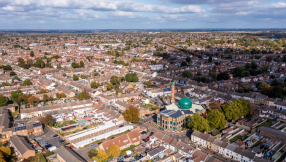Pilgrim Homes conference - caring for God's older children
The major-one day conference was hosted by Pilgrim Homes, a charity devoted to caring for elderly Christians, and brought together more than 400 Christians around the theme of 'The World, The Church and Older People'.
In a welcoming letter to the event, Pilgrim Homes Chief Executive, Peter Tervet, said, "The way we care for one another particularly for our older brothers and sisters in Christ, is not only a response to Scripture, but a witness to those around us in the world."
He added, "Society's values are based on Darwinian thinking that says the elderly have had their day, and the needs of younger people should be given priority. The Bible says otherwise."
The conference consisted of eight different workshops dealing with the spiritual and physical aspects of care for elderly people and for terminally ill patients.
Workshops dealt with subjects such as dementia, government policies affecting old age, housing and care for elderly people as well as pastoral and spiritual care.
Peter Saunders, the General Secretary of the Christian Medical Fellowship led a workshop on "Euthanasia and the Value of Life" in which he spoke against the arguments for euthanasia from a Christian perspective.
Saunders pointed out that the majority of terminally ill people do not favour euthanasia in spite of the media's extensive coverage of cases like that of Diane Pretty, who suffered from motor neurone disease and fought a long and ultimately unsuccessful legal battle to gain the right to die, .
He said, "If you take motor-neurone disease patients, the vast majority, if you care for them properly, do not want euthanasia. In fact very few terminally ill patients do once they've experienced good palliative care. It tends to be the worried well who push for a change in the law the most."
He reminded conference delegates that there was a biblical basis for providing care for those who are dying instead of euthanasia.
"Christian ethics is all about the strong making sacrifices for the weak and I see that as a Christian doctor that we must use whatever skills and abilities God has given us whatever sacrifice that involves in terms of cost or emotional investment to serve those who are weak, and who is weaker than someone with a terminal illness."
In the morning session, the London Theological Seminary's Basil Howlett said that social trends, including "rampant disrespect for life" and the widespread attitude that ageing is a "disaster", were making the pastoral care of the elderly "more urgent".
"The attitude of society towards the elderly is very sad right now," he told the conference, reflecting that many young people "had little time or inclination to care for old people".
He also warned that there was "incredible pressure" on older people because of the commonplace feeling in society that they are a nuisance and inconvenient. The "idolisation" of the young and beautiful was having a "devastating" effect on elderly, he added.
"You have to reassure them that they are an important part of the body of Christ and your local church," he told conference delegates. "We hear all the time that young people are the hope of the church. That is just not biblical. Christ is the hope of the church...and he can use people regardless of age," he said.
Other speakers at the conference included Colin Hart, Director of The Christian Institute, and Paul Mallard, pastor and former President of the Fellowship of Independent Evangelical Churches.













